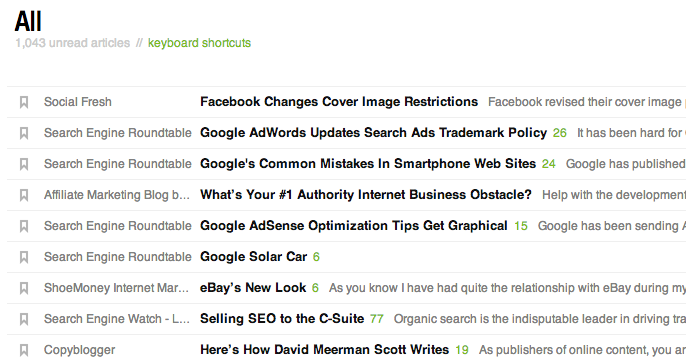

Magic 5-Step Plan To Writing a Post That Will Easily Win Pulitzer Prize
This is a guest contribution by Tim Soulo.
I bet the next sentence will totally blow your mind!
Ready?
Though… I think a bit of preparation wouldn’t hurt. No really, when I told this to my friend the other day he had a heart attack and I had to drive him to the hospital (he’s ok now btw).
But you just have to know that! This is probably the most important piece of advice in your whole career.
So read along…
1. The Power of The Post Opener
Ok. I was bluffing, I’m sorry. I don’t have a “sentence that will blow your mind”. But did you even notice how easily you got involved into reading this post and how intrigued you were to know what’s going to happen next?
If you look at the very first sentence of this post, it’s sole purpose is to make you read the next one. But the next one doesn’t answer the question I’ve planted in your head (“what will blow my mind?”), it just adds more drama to keep you intrigued and make you read even further.
This kind of “post opener” follows the well known AIDA formula: Attention, Interest, Desire, Action.
- My first sentence got your Attention.
- The story about a friend that got heart attack got you Interested.
- The statement “you have to know that” played with your Desire.
- And I invited you to take Action by offering to “read along”.
But what’s the point of going an extra mile to make your post opener intriguing and catchy? Actually there are quite enough reasons for that:
- If a person opens your post, this doesn’t mean he will read it. Your post opener helps him to make the decision if he wants to read this post or not;
- Generally people don’t want to read, they just want to consume some valuable information. If you fail to present it in an entertaining and engaging way someone else might win their attention;
- We’re easily distracted: an email or tweet or maybe a phone call can easily steal our attention and make us forget about the post we were reading. So your opener should be good enough to make people ignore everything else until they finish it.
2. Who Needs An Opener When The Headline is Poor?
You have the best opener in the world, but what if noone will ever see it? Why?
Because your headline isn’t good enough!
My RSS reader pretty much illustrates the point:
Same thing with updates on Twitter or Facebook or search listings in Google in every case the headline is what you see first.
Headline is the most important part of your post. Literally. So make sure it’s compelling enough to steal person’s attention.
There are plenty of good tips and techniques to writing powerful headlines, but I think if you master this single document “Headline Hacks” your headlines will rock!
3. Subheadings are Headline’s Best Friends
Subheadings are not only used to improve the structure of your post, but they actually improve the chances of the post to actually get read.
And here’s how.
Many of us (including myself) will always skim through the post quickly in order to determine how big it is, how much time it will take to read it and how valuable it is for us. In case your post is just a since chunk of text and there’s nothing that catches the eye and gives you an idea of what the post is about most people won’t risk their time to read it.
By using interesting and compelling subheadings you’re drastically increasing the chances of your post to be read.
4. Your Post Structure And Styling May Cost You Readers Too
Let’s keep talking about the “phenomenon” of skimming the post before reading it. What else might catch the eye?
- Pictures? Absolutely!
- Numbered (or unnumbered) lists? Definitely!
- Text in bold or italic? Pretty much.
- Quotations? Yeah, why not.
Everything that’s different from the common paragraph of text might get person’s attention and make him quickly read this part. Don’t be afraid to use photos, graphics, videos or anything else along these lines.
Take a look at my post and see which of these things I’ve already used and if they fit naturally and really help you (as a reader) to consume information.
And by the way, make sure your paragraphs of text are not bigger than 3-4 sentences, because most people have have some hidden psychological fear of huge chunks of text and they just won’t read them.
All in all, usage of all these things inevitably leads to improving the logical structure of your post. Subheadings alone mean that the article is not just a random flow of thought, but it’s actually structured into certain logical parts, which makes it a lot easier to comprehend it.
BONUS TIP: Try to always add captions for the images. Studies show that 80% of people who are skimming through the post will read the image captions.
5. All of The Above Is Useless Without Research
We love to think that we have enough knowledge in our heads to produce compelling content which others will find interesting and valuable. Yet quite often we’re awfully wrong.
To prove my point I invite you to google the hell out of the next topic that you’re going to write about and see yourself if there’s anything you didn’t know. And besides, if it so happens that there are tons of posts on the topic already listing the same thoughts and ideas you were about to write… maybe the world doesn’t need yet another one?
But if you’re confident that you can do a much better post than any of those already there go for it, my friend! And make sure you send me the link once it’s published for I want to read that!
One last thing I love about a thorough research it makes your brain work! I don’t remember where I heard this advice first, yet it works for me so damn good:
When you need to generate some fresh ideas or uncanny solutions go read all you can on the topic and then do something else and let your brain rest and slowly digest all the information you’ve just consumed. Sooner or later a great idea will strike you out of nowhere! Believe me, this really works!
The Topic Is Exhausted? Talk To Your Readers!
Don’t know about you, but I write articles with a sole purpose of communicating to people. And I love when the communication goes both ways for otherwise I might as well just bury the article on my hard drive once I’m done writing it.
I’m sure you guys have something to say about this very post. So speak out! I’ll be glad to continue the conversation in comments.
Tim Soulo is a blogging experimenter and conversion junkie. He is passionate about discovering new marketing ideas and sharing them with his readers. Why don’t you visit his personal blog at BloggerJet.com and take his free email course on boosting your traffic.
Originally at: Blog Tips at ProBlogger
Magic 5-Step Plan To Writing a Post That Will Easily Win Pulitzer Prize
Facebook comments:
No Comments »
No comments yet.
RSS feed for comments on this post. TrackBack URL
Leave a comment
















